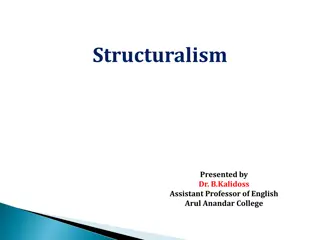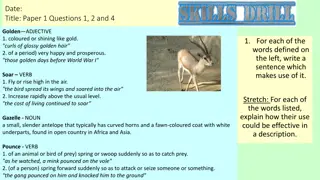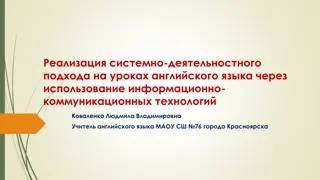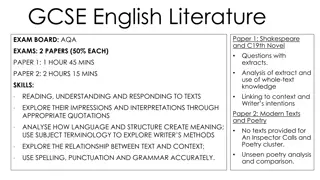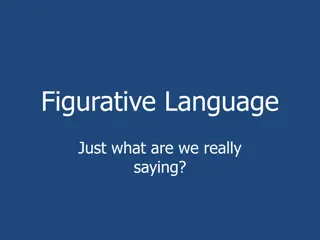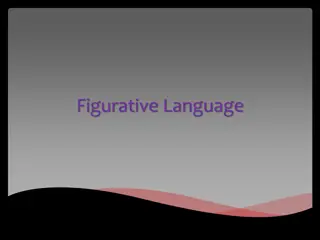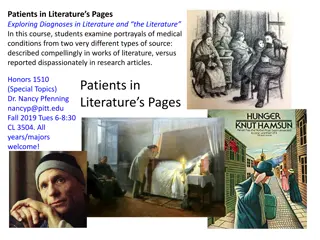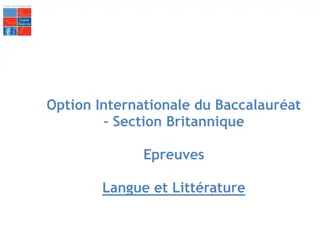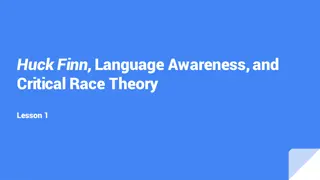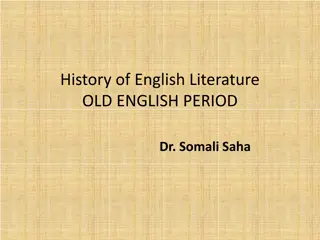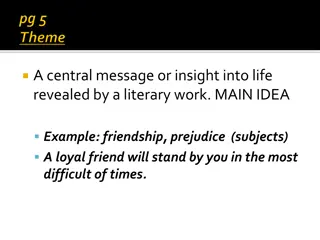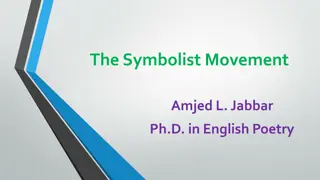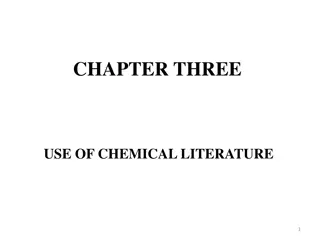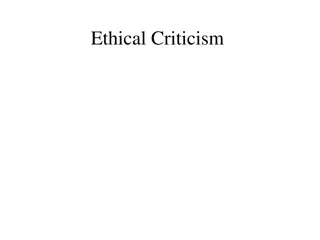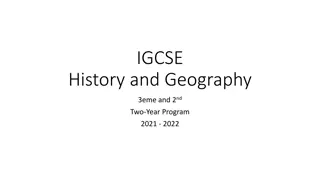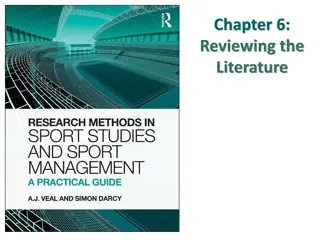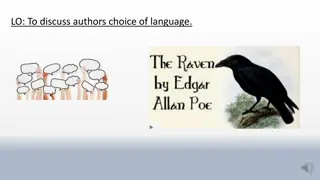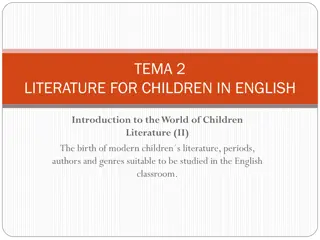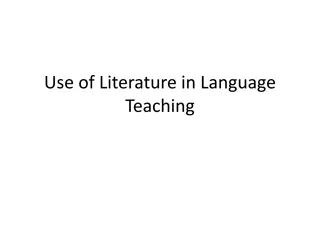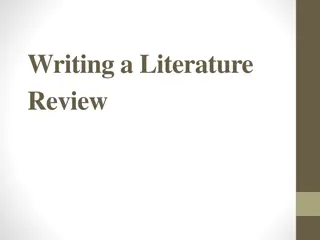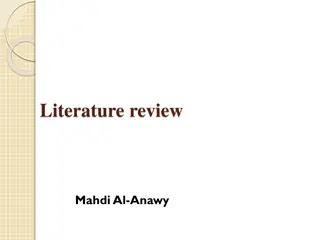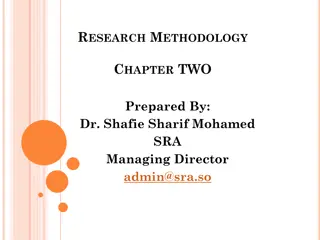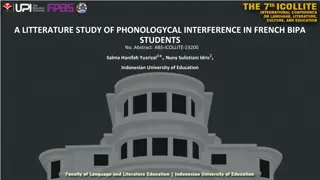Exploring the Two Dimensions of Meaning: Similarity and Contiguity in Language and Literature
This content delves into the dimensions of meaning, focusing on similarity and contiguity, as explored in language and literature. It discusses the significance of Saussure's paradigm and syntagm, Jakobson's theories on similarity and contiguity in discourse, and the impact of brain damage on langua
0 views • 66 slides
Understanding Translation: Key Concepts and Definitions
Translation involves transferring written text from one language to another, while interpreting deals with oral communication. Etymologically, the term "translation" comes from Latin meaning "to carry over." It is a process of replacing an original text with another in a different language. Translat
11 views • 76 slides
Embracing Gender-Neutral Language in NA Literature
Explore the movement towards gender-neutral and inclusive language in NA literature to create a more welcoming environment for all members. Learn how language changes can improve inclusivity and help individuals feel seen and valued on their recovery journey.
1 views • 15 slides
English Language & English Literature
This curriculum overview outlines the structure of AQA English Language and Literature GCSE courses, including exam details, grade boundaries, and core concepts for literary analysis. It emphasizes the development of respect, responsibility, and resilience in students through exploring a range of te
3 views • 13 slides
Understanding Structuralism in Literature: Key Concepts and Evolution
Structuralism, as presented by Dr. B. Kalidoss, explores the order and arrangement in various forms like language and literature. It delves into the interrelationship between units and rules, proposing a deeper understanding of texts through linguistic analysis. The evolution of structuralism in lit
0 views • 17 slides
Effective Strategies for Literature Searches and Re-Use of Scholarly Literature
Conducting literature searches involves surveying existing publications and information on a specific topic. Different search strategies, from simple searches to systematic queries and snowballing, are utilized based on research needs. Learning objectives include building search strategies, using ad
2 views • 19 slides
Introduction to Isixhosa Language and Literature - Exploring Characters and Themes
This content provides an overview of Isixhosa as a first additional language (FAL) and delves into key aspects of literature such as character development and themes. It discusses the importance of characters in storytelling, emphasizing the significance of round and flat characters. The article als
3 views • 28 slides
Language Analysis in Literature Exam Papers
In this content, the use of language in exam papers for literature analysis is discussed. Definitions and examples of words like "golden," "soar," "stretch," "gazelle," and "pounce" are provided. The focus is on understanding language techniques, common mistakes in language analysis questions, and p
2 views • 10 slides
Engaging Online Educational Resources for Language and Literature Learning
Discover a plethora of online resources to enhance language and literature learning, including interactive quizzes, reading comprehension tools, phonics exercises, literary trivia, and historical projects. From exploring English history to delving into famous literary works, there's something for ev
0 views • 15 slides
Comprehensive Literature Review Guidelines for Your Dissertation
Discover expert guidelines for conducting a thorough literature review in your dissertation. Explore topics such as literature search strategies, theoretical frameworks, review of the literature, synthesis, and analysis, with actionable tips provided throughout.
0 views • 11 slides
Exam Preparation Guide for GCSE English Literature and Language
Prepare effectively for your GCSE English Literature and Language exams by understanding the requirements of each paper, practicing with provided extracts and models, creating your own questions and responses, and analyzing texts with contextual knowledge. Enhance your skills in analyzing language,
0 views • 11 slides
Exploring the Significance of Persian Language and Literature in Indian History
Persian language and literature hold a crucial place in Indian history, serving as a prime source for understanding the medieval period. Scholars in India have dedicated their lives to preserving and promoting Persian history, language, and literature. The rich cultural heritage of India, dating bac
0 views • 9 slides
Exploring Figurative Language in Literature
Delve into the world of figurative language with an overview of alliteration, allusion, antithesis, cliché, colloquialism, connotation, denotation, and euphemism. Understand how these literary devices enhance writing through examples and explanations. Discover how poets use alliteration to create a
0 views • 24 slides
Understanding Figurative Language in Literature
Figurative language adds depth and creativity to writing by using words in ways beyond their literal meanings. Examples include metaphors, similes, alliteration, and hyperbole. Poetry often employs figurative language to evoke sensory experiences and emotions. Allusions and idioms are also common fo
0 views • 32 slides
Mastering the Literature Review Process
Understanding the significance of literature review, this guide emphasizes the essential steps involved in conducting a successful literature review - from planning and research problem identification to critical analysis and contribution to existing literature. It explains the importance of develop
0 views • 16 slides
Effective Strategies for Conducting Business Research Literature Review
This literature review provides insights into conducting business research effectively, covering topics such as how to search, read, and write literature reviews, along with the goals and types of literature. It emphasizes the importance of generating research ideas, demonstrating knowledge, and int
1 views • 13 slides
Exploring Diagnoses in Literature and the Literature
This course delves into portrayals of medical conditions in literature versus research articles. It explores the intersection of science and literature, analyzing works like "Black Swan Green" and "The Reason I Jump" to understand how they depict conditions like stuttering and autism. Through studen
1 views • 28 slides
Evolving Perspectives on Literature and Translation
Explore the intertwined relationship between national literature, comparative literature, and world literature, delving into the evolution of translation studies. Reflect on the shift from national literary histories to world histories of literature, highlighting the significance of world literature
3 views • 54 slides
Understanding Figurative Language: A Guide to Metaphors, Similes, and More
Figurative language is a powerful tool used by writers to evoke emotions and create vivid imagery in the minds of readers. It goes beyond literal meanings, allowing for deeper interpretations and connections with the subject matter. This guide explains the difference between figurative and literal l
0 views • 40 slides
International Baccalaureate British Section Language and Literature Exam Details
This detailed guide outlines the structure and content of the International Baccalaureate British Section Language and Literature Exam. It covers the choice of works, written exam requirements, oral exam format, and synoptic topic discussion. Students will find information on the types of texts, ess
0 views • 11 slides
Exploring Language, Dialects, and Critical Race Theory in Literature
Delve into the complexities of language diversity, dialects, and critical race theory through literary works such as "Huck Finn" and "Brown Girl Dreaming". The discussions cover topics like the right way to speak, perceptions of dialects in literature, the power dynamics of language, and societal at
0 views • 22 slides
Overview of Anglo-Saxon Literature in Old English Period
The Old English period in English literature, dominated by the Anglo-Saxons, showcased a rich tapestry of poetic works, notable authors, and distinct dialects. Key literary features include pagan and Christian elements, as seen in epic poems like Beowulf and Caedmonian Poems. Additionally, the perio
0 views • 11 slides
Understanding Literature: Elements and Genres Explained
Explore the key concepts of literature including central messages, symbolism, genres like poetry, prose, and drama, and narrative perspectives. Learn about the different forms of written language, types of literature, and the art of storytelling through examples and descriptions.
0 views • 54 slides
Understanding the Symbolist Movement in Literature
The Symbolist Movement in literature emerged in France in the 1850s, lasting till 1900, influencing 20th-century arts and bridging Realism to Modernism. Symbolists aimed to convey personal, dream-like states with metaphorical language, challenging positivism and realism. Stylistically, they emphasiz
0 views • 16 slides
Exploring Sociolinguistics: Language Variation and Social Factors
Sociolinguistics delves into the study of language variation influenced by social factors, examining the relationship between language and its social context. It explores various aspects like standard pronunciation, language choice, speech acts, language components, language variety, and factors suc
0 views • 73 slides
Understanding the Importance of Chemical Literature in Research
Reviewing chemical literature is essential in the research process to identify existing knowledge, develop hypotheses, plan methodologies, and discover unanswered questions. The vast and complex nature of chemical literature poses challenges in finding relevant information, especially with evolving
0 views • 22 slides
Understanding Assembly Language Programming for Computing Layers
Assembly language is a low-level programming language that enables direct interaction with a computer's hardware components. This content explores the fundamentals of assembly language, the relationship between human-readable machine language and binary code, an assembly language program for multipl
0 views • 31 slides
Exploring Ethical Criticism and Literature's Human Possibilities
Ethical criticism in literary studies revolves around the intersection of ethics, literature, and criticism. It tackles concerns about the relationship between value judgments, ethics, and aesthetics, emphasizing the importance of reconnecting criticism with moral principles. Literature offers a dee
0 views • 21 slides
IGCSE Two-Year Program Overview for History and Geography 2021 - 2022
In the IGCSE History and Geography 3eme and 2nd Two-Year Program for 2021 - 2022, students prepare for exams over two years, with classes focused on Language and Literature subjects. The program aims to develop skills in reading, writing, critical thinking, and spoken language use. Exams include the
0 views • 10 slides
Understanding Language Anxiety in Foreign Language Learning and Teaching
Explore the impact of language anxiety on students and teachers in foreign language learning and teaching contexts through insights from Dr. Christina Gkonou's research. Delve into the theoretical background, implications for language education, and real-life experiences shared at the Essex Language
0 views • 25 slides
Understanding the Importance of Literature Review in Research
Exploring the roles of literature in research, this content emphasizes the significance of reviewing existing literature to gather ideas, compare methodologies, and integrate supportive information. It also highlights the types of reviews and essential questions to consider during the literature rev
0 views • 12 slides
The Status of Literature in Secondary Schools of the O.E.C.S. - Research Findings by Dr. Anthony Felicien
Research by Dr. Anthony Felicien examines the status of literature in secondary schools of the O.E.C.S., focusing on the decline of interest in literature among students, influenced by historical curriculum changes and parental attitudes. The study highlights the importance of studying literature fo
0 views • 35 slides
Exploring Authors' Language Choices in Literature
Dive into the analysis of authors' deliberate language choices in literature, deciphering the meanings behind selected words and their impact on creating vivid imagery and setting tones within the text. Explore how authors strategically use words like "dreary" and "midnight" to evoke specific emotio
0 views • 6 slides
Evolution of Children's Literature in English: From Alice to Modern Times
Explore the birth of modern children's literature starting with the publication of "Alice's Adventures in Wonderland" in 1865 by Charles Dodgson (Lewis Carrol), marking a shift towards entertaining and engaging literature specifically for children. Prior to this, children mainly read folklore and ad
0 views • 35 slides
Exploring Literature in Language Teaching
Literature plays a significant role in language teaching as it offers authentic materials, motivates learners, and enhances cross-cultural awareness. Literary works help develop language skills and critical thinking while providing insights into cultural aspects and artistic expressions. Various app
0 views • 27 slides
Mastering the Art of Writing Literature Reviews
Understanding the essence of a literature review, its descriptive and analytical components, selecting key articles, and finding relevant sources are essential steps in crafting a comprehensive literature review. By integrating ideas from various sources and highlighting crucial findings, a literatu
0 views • 18 slides
Comprehensive Guide to Literature Review Process
A literature review is essential before conducting research to identify existing information, gaps in literature, major works, and relationships between studies and theories. Follow steps such as defining the topic, sourcing information, discussing findings, and drafting to write an effective litera
0 views • 8 slides
Effective Strategies for Conducting a Literature Review in Research Methodology
Understanding the importance of literature review in research methodology, this chapter discusses the objectives, aims, and guidelines for writing a comprehensive literature review. It emphasizes the significance of identifying gaps in existing knowledge, structuring the review, and organizing infor
0 views • 33 slides
GCSE English Language and Literature Overview
GCSE English Language and Literature subjects are led by Mrs. A. Baker and Mr. Doodson. English Language is examined by OCR, while English Literature is examined by Edexcel. Both subjects have two examination papers worth 100% of the grade. English Language papers focus on reading and writing skills
0 views • 14 slides
Phonological Interference in French BIPA Students: A Literature Study
BIPA students face challenges in pronunciation due to phonological interference, especially in French-speaking students. This study explores the linguistic aspects contributing to pronunciation errors and proposes phonetic corrections. Literature review discusses language interference and factors in
0 views • 11 slides




